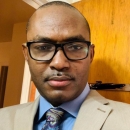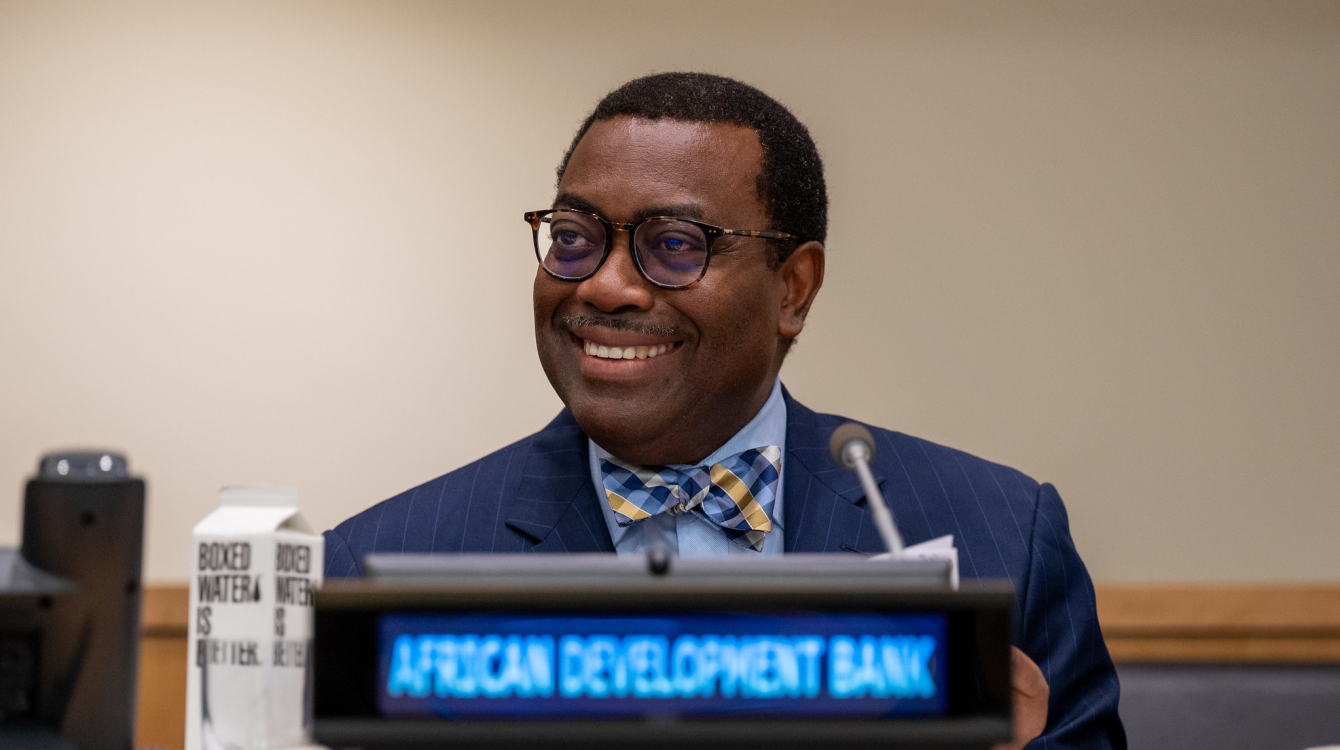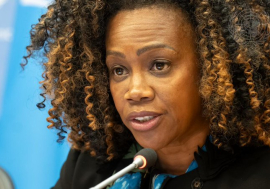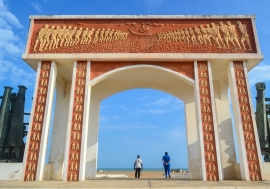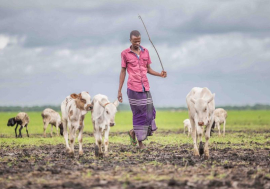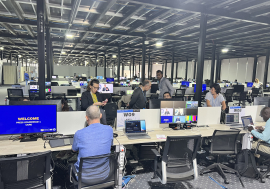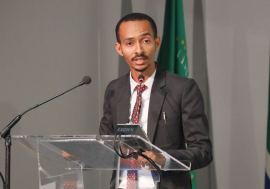Akinwumi Adesina is the President of the African Development Bank, which is headquartered in Abidjan, Côte d'Ivoire. He was in New York in September to participate in UN General Assembly activities. In Part 1 of this interview with Africa Renewal’s Kingsley Ighobor, Mr. Adesina discusses the impact of the COVID-19 pandemic on Africa’s development, climate change, and the role of AfDB in tackling the continent’s development challenges. These are excerpts from the interview.
About 30 million Africans slipped into poverty last year due primarily to COVID-19, the climate crisis, and the war in Ukraine. What does the continent need to do to address the situation, and what role is the AfDB playing?
We often talk about the impact of the war on the rest of the world. We also should think about the impact it's having on the people of Ukraine. This is a war that shouldn't have happened. I hope the world will make sure that peace reigns because the Ukrainian people deserve it.
To your question, the war in Ukraine led to a significant increase in commodity prices, especially for wheat and maize. And in the case of Africa, because of the blockage around the Black Sea, Africa will not be able to import about 30 million metric tons of food from Ukraine and Russia. Think about it: it's mind-boggling that Africa depends on a small country like Ukraine for 31 per cent of its maize. The reality is, besides food price inflation across Africa, the crisis could potentially lead to a food crisis.
The African Developing Bank put in place a facility of $1.5 billion to support Africa, through what we call the African Emergency Food Production Facility, to produce 38 million metric tons of food—wheat, rice, maize, and soybean—with a total value of $12 billion. And this will support 20 million farmers.
The point to bear in mind is how rapid and responsive we have been at the AfDB. Within 45 days of this facility, we approved operations for 24 countries valued at $1.13 billion.
At what point will Africans begin to feel the real impact of this investment because many families are already struggling?
Well, we didn't choose this war; we are only responding to it. The financing is going out, and we are looking at the dry season, which will begin in November in many parts of Africa. The dry season is when you do wheat production. So, you will feel the impact once production is ongoing.
Let me tell you what we've done with wheat production in Ethiopia. The AfDB introduced what's called heat-tolerant wheat varieties. We gave Ethiopia 65,000 metric tons of seed. They [Ethiopians] increased the area they cultivate from just 5,000 hectares in 2018 to 187,000 hectares by 2019/2020. And by this year, they reached 645,000 hectares.
So, in just three years, Ethiopia became self-sufficient in wheat. Next year, they will become a net exporter, exporting 2 million metric tons to Djibouti and Kenya. That tells you that the facility we put in place will transform Africa’s agricultural sector and boost food production.
Let’s talk about climate change. Africa loses between 5 per cent and 15 per cent of its GDP because of the climate crisis. COP27 will take place in Sharm el-Sheikh, Egypt, next November. What is your idea of success for Africa at COP 27? And is your bank doing anything to tackle the climate crisis?
First, Africa contributes only 3 per cent to greenhouse gas emissions but suffers disproportionately from its negative impacts. Take a look at Cabo Verde. In the last five years, rains have been rare. I went to Mauritania where vast areas have been deserted because of a lack of rain. You look at the Horn of Africa and the conflicts between farmers and herders; the Lake Chad basin has literally dried up.
Africa today loses between $7 billion and $15 billion a year to climate change. And if things don't change, it will be $50 billion a year by 2030. Africa doesn't have access to the financing it needs to adapt to climate change and meet nationally determined contributions. By 2030 Africa will need between $1.3 to $1.6 trillion. You're talking about a lot of money.
Africa today loses between $7 billion and $15 billion a year to climate change. And if things don't change, it will be $50 billion a year by 2030. Africa doesn't have access to the financing it needs to adapt to climate change and meet nationally determined contributions. By 2030 Africa will need between $1.3 to $1.6 trillion.
When I was elected in 2015, only 9 per cent of AfDB's total financing was related to climate change. By 2019, it was 38 per cent. Now we are at 41 per cent.
Adaptation is Africa's challenge, but how do you adapt to what you didn't cause? But AfDB is devoting 67 per cent of its climate financing to adaptation.
Going to COP27, we must deliver climate adaptation finance at scale. The AfDB and the Global Center on Adaptationdeveloped and rolled out what's called the African Adaptation Acceleration programme, which is to mobilize $25 billion in climate adaptation finance for Africa. It is the largest-ever effort on adaptation in Africa or even globally.
The AfDB has what's called the African Development Fund (ADF), which supports low-income countries. We call the countries that use the fund ADF countries. Guess what? Nine out of the 10 countries in the world most vulnerable to climate change are in sub-Saharan Africa. One hundred percent of them are from the ADF countries; and while the ADF countries need $60 billion a year to adapt to climate change, they only get today $18 billion a year.
The replenishment process of the ADF allowed us to introduce the Climate Action Window through which we aim to mobilize up to $13 billion in support of these countries.
That money will provide 20 million people—farmers—access to climate resilient technologies for agriculture. In addition, it will provide an additional 20 million farmers access to insurance products — weather-index insurance against extreme weather patterns such as drought or flood. It will help to rehabilitate a million hectares of degraded land. It will provide 18 million people with access to water. It will supply 840 million cubic metres of water storage and leverage about $2.6 billion of private finance for adaptation.
As we go to Sharm el-Sheikh, my message is this: Africa is suffering what it didn't cause. The developed world, a long time ago, promised $100 billion a year in support of climate finance for developing countries. What we get now is a lot of talk and zero financing. It's time to pay up because Africa is suffering tremendously from the impact of climate change. It’s Africa’s COP, so let's deal with Africa’s problems by putting the money on the table.
The African Pharmaceutical Technology Foundation will be a game changer for African pharmaceutical companies. Africa can potentially produce the vaccines that it needs not only for COVID-19 but for malaria, TB and other diseases.
The AfDB is helping establish the African Pharmaceutical Technology Foundation. What do you aim to achieve with the Foundation?
If there's something we’ve learned when COVID hit, it is that Africa depended on the rest of the world for access to basic medicines, access to gloves, access to oxygen, and access to vaccines. Africa's needs were not prioritized.
Some countries banned the exports of vaccines. So, we cannot let the health of 1.3 billion Africans depend on the benevolence of others.
Africa must assure its health security; therefore, it needs investment in quality healthcare infrastructure, primary healthcare, secondary healthcare, and tertiary healthcare.
It must build pharmaceutical capacity to produce essential medicines. Africa produces only 1 per cent of its vaccine needs and imports 80 per cent of essential medicines.
So we decided that Africa needs to manufacture its own vaccines. But you need the know-how, you need to understand the processes, and you need to have the technology. Many of these processes and technologies are patented and intellectual property (IP) protected. You can’t have access to them. And the reason you can't have access to them is there is no intermediate framework that allows the African pharmaceutical companies to negotiate technology access with global firms that will trust the African companies to use it properly, so it does not end up in other countries.
The African Pharmaceutical Technology Foundation will do that intermediation on behalf of African pharmaceutical companies. I believe that African pharmaceutical companies need to upgrade their quality, meet WHO standards, and then be able to use these IP-protected technologies. So that negotiation capacity is going to be there.
Second is that to support the long-term development of vaccines and medicines, you need to have a research and development (R&D) system. The Foundation will support national and regional R&D ecosystems in basic and pharmaceutical sciences, which will allow Africa to use its human capacity.
Third, it will support the African pharmaceutical companies to have access to finance.
And fourth, if you actually produce the vaccines, at the end of the day, somebody's going to have to buy them. So the Foundation will work with WHO. I just had meetings with Tedros Ghebreyesus, the Director-General of the World Health Organization and Ngozi Okonjo Iweala, the Director-General of the World Trade Organization, and we are all aligned on this.
The African Pharmaceutical Technology Foundation will be a game changer for African pharmaceutical companies. Africa can potentially produce the vaccines that it needs not only for COVID-19 but for malaria, TB and other diseases.
Is there a timeframe for realizing this dream?
We have already established the Foundation. We are forming the Eminent Advisory Council, which will be announced soon. It will be a group of high-level global leaders. And then, we will set up the Executive Board to run the Foundation. By next year we will have the Foundation running.

